
Highly Recommended *****
The year is circa 1975 and the golden glow of the Wisconsin sunset brings with it a cool breeze to the Alpine Valley Amphitheatre. As night surrounds the fields dotting the converted ski resort, a sea of patched denim jackets, beards, and raucous voices fill the valley like an ancient ritual ground brought to life. A haze follows as the crowd files in, the lights go up on the clamshell stage, and Ian Anderson (best known as the multi-instrumental front man of Jethro Tull) hits the first note of the show on his silver flute. Like musical alchemists, Ian and his band concoct a potent mixture of heavy, guitar centric prog-rock and classical elements to create a style all its own. Magnifying Jethro Tull’s hypnotic sound is Ian Anderson’s energy and stage presence in those days. As an audience member, it’s impossible not to be ensnared by the man standing in front of you playing the flute like a 16th century bard who’s listened to plenty of Rush. Standing on one leg in his iconic flamingo pose, Ian launches his flute into the air, causing it to evaporate into the glare of the stage lights. Without missing a beat, he snatches the spinning flute from the air and lands the final note as the lights go down. A man in the audience calls out, “he’s a wizard! He’s a wizard!”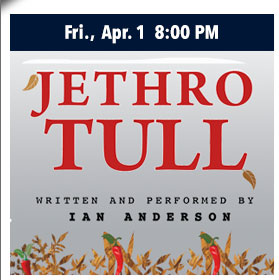
Jethro Tull officially broke up in 2014, but that would not be the end of Ian Anderson and his theatrical styling. The Genesee Theatre in Waukegan, Illinois welcomed Ian on the first stop of his solo tour entitled Jethro Tull: The Rock Opera. While many jukebox musicals such as the 1980’s sing-along musical Rock of Ages incorporates licensed music, the plot often takes a back seat to the sets and individual performances. Not so with Jethro Tull: The Rock Opera as the band’s unique style has been begging for the rock opera treatment for decades. If you were to listen through Jethro Tull’s catalogue of concept albums, themes such as the destruction of farmland to support infrastructure and the moral implications of genetic engineering on crops are placed front and center. I was glad to see these themes incorporated into a story of the band’s namesake, however knowledge of the real Jethro Tull is definitely required to get the most out of this show.
Several original tracks were also written and performed to bridge the gaps between the recognizable hits such as Aqualung & Locomotive Breath to have them make sense within the context of the story. However even these famous songs (which received lengthy standing ovations) had been altered slightly to fit the confines of the rock opera genre. Whether or not this fact is discouraging to long-time Tull fans depends on how open they would be to the show’s format. Make no mistake; this is not your typical, straightforward concert. In addition, much of the story itself was told via video projection that featured several actors and band members playing various characters, while the live band rocked in the foreground. I found that my focus was usually split between the two, although it was Ian Anderson’s showmanship that captivated me until the show’s end.
The band not only had to put on a good show in and of itself, but also play off of & harmonized alongside the accompanying video projected behind them. It all worked incredibly well, although some of the mics in the venue were a little under mixed, making the vocals tough to understand at times. Nevertheless, Ian Anderson has not skipped a beat when it comes to his flute playing. Tracks such as Living in the Past sounded better than the studio recording thanks in part to the band’s guitarist Florian Opahle who took notable stylistic inspiration from bands such as Iron Maiden. Ian himself was clearly having a blast, as he zipped from musician to musician shredding on the flute while encouraging them each to play as powerfully as possible. I got the impression that he would be a wonderful person to collaborate with musically, as he infused so many different inventive ideas and concepts into this show.
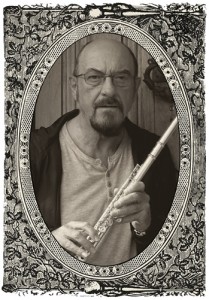 By the final bow, I recognized what my father did at Alpine Valley circa 1975; the man might actually be a wizard. Being able to balance so many different elements, from creating the show’s story, to referencing the band’s own namesake and putting on a terrific performance alongside a pre-recorded video after a long flight from the UK was nothing short of remarkable. My father and I were fortunate enough to be able to say a few words to Ian after the show about the consistency of his talent and the power of his performance. With great appreciation and humility he thanked us, signed our tickets and drove away into the icy Waukegan night. I would highly encourage anyone who’s new or old to Jethro Tull to check out this show when it arrives near you, just be sure to Google the original Jethro Tull first.
By the final bow, I recognized what my father did at Alpine Valley circa 1975; the man might actually be a wizard. Being able to balance so many different elements, from creating the show’s story, to referencing the band’s own namesake and putting on a terrific performance alongside a pre-recorded video after a long flight from the UK was nothing short of remarkable. My father and I were fortunate enough to be able to say a few words to Ian after the show about the consistency of his talent and the power of his performance. With great appreciation and humility he thanked us, signed our tickets and drove away into the icy Waukegan night. I would highly encourage anyone who’s new or old to Jethro Tull to check out this show when it arrives near you, just be sure to Google the original Jethro Tull first.
To see the dates and locations, visit www.jethrotull.com
you can also purchase tickets, recordings and books on this site.
To see what else is coming to the beautiful Genesee Theatre in Waukegan, check out www.geneseetheatre.com



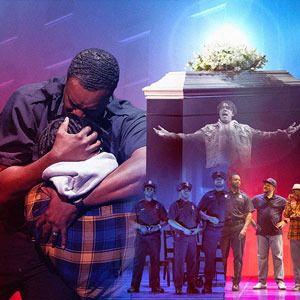
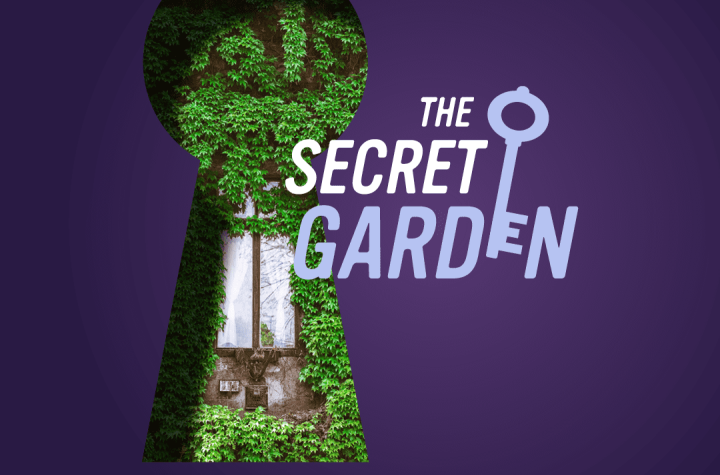
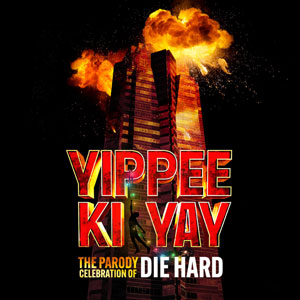
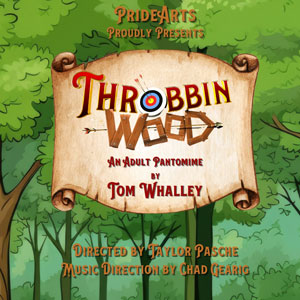
More Stories
“Songs From the Bench”
Bryan Eng at The Jazz Club- Paul Lisnek
“Sondheim Tribute Revue” TWO looks- Reviewed by Al Bresloff and Paul Lisnek